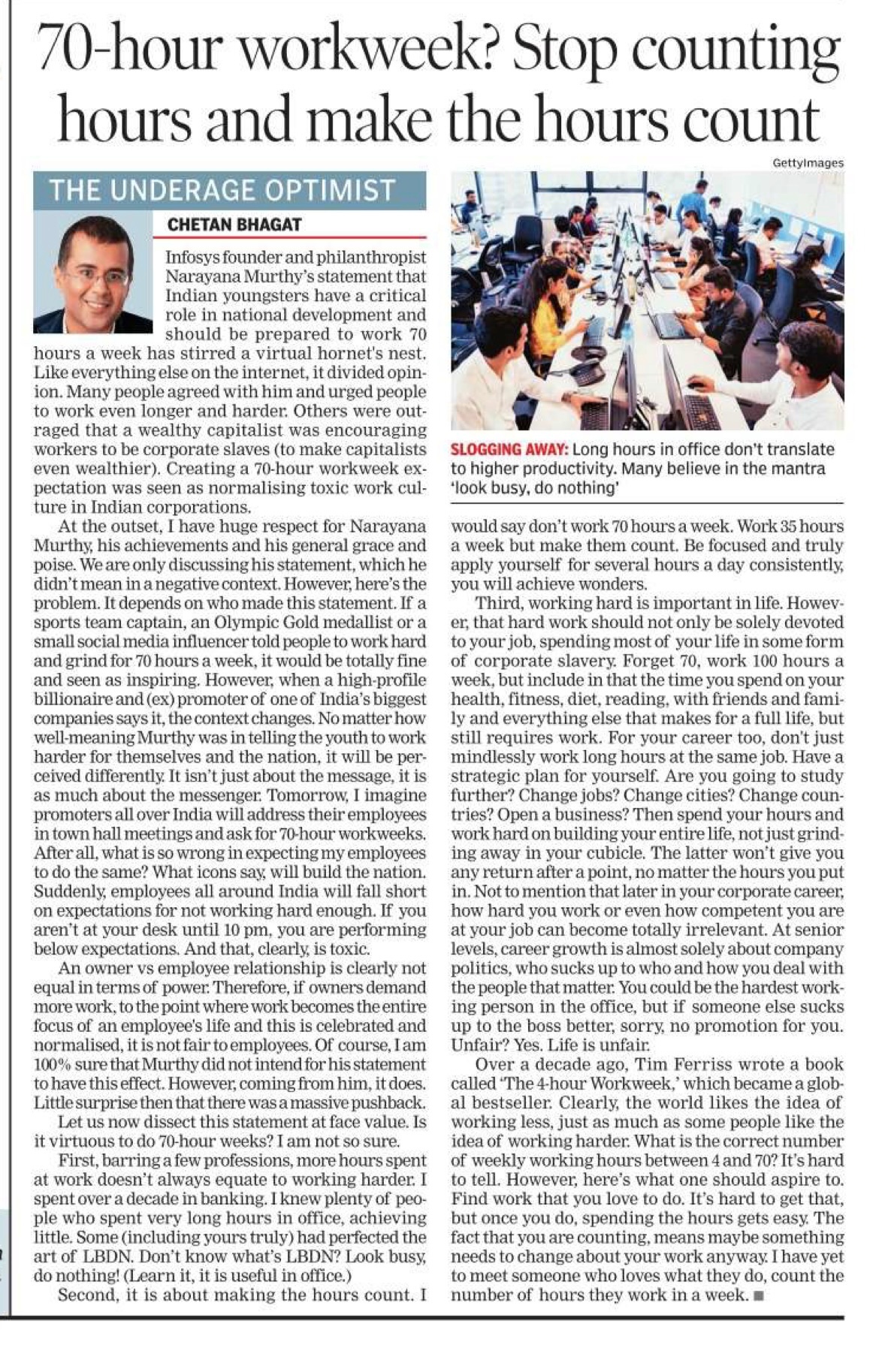Infosys founder and philanthropist Narayana Murthy’s statement that Indian youngsters have a critical role in national development and should be prepared to work 70 hours a week has stirred a virtual hornet’s nest. Like everything else on the internet, it divided opinion. Many people agreed with him and urged people to work even longer and harder. Others were outraged that a wealthy capitalist was encouraging workers to be corporate slaves (to make capitalists even wealthier). Creating a 70-hour workweek expectation was seen as normalising toxic work culture in Indian corporations. At the outset, I have huge respect for Narayana Murthy, his achievements and his general grace and poise. We are only discussing his statement, which he didn’t mean in a negative context. However, here’s the problem. It depends on who made this statement. If a sports team captain, an Olympic Gold medallist or a small social media influencer told people to work hard and grind for 70 hours a week, it would be totally fine and seen as inspiring. However, when a high-profile billionaire and (ex) promoter of one of India’s biggest companies says it, the context changes. No matter how well-meaning Murthy was in telling the youth to work harder for themselves and the nation, it will be perceived differently. It isn’t just about the message, it is as much about the messenger. Tomorrow, I imagine promoters all over India will address their employees in town hall meetings and ask for 70-hour workweeks. After all, what is so wrong in expecting my employees to do the same? What icons say, will build the nation. Suddenly, employees all around India will fall short on expectations for not working hard enough. If you aren’t at your desk until 10 pm, you are performing below expectations. And that, clearly, is toxic. An owner vs employee relationship is clearly not equal in terms of power. Therefore, if owners demand more work, to the point where work becomes the entire focus of an employee’s life and this is celebrated and normalised, it is not fair to employees. Of course, I am 100% sure that Murthy did not intend for his statement to have this effect. However, coming from him, it does. Little surprise then that there was a massive pushback. Let us now dissect this statement at face value. Is it virtuous to do 70-hour weeks? I am not so sure. First, barring a few professions, more hours spent at work doesn’t always equate to working harder. I spent over a decade in banking. I knew plenty of people who spent very long hours in office, achieving little. Some (including yours truly) had perfected the art of LBDN. Don’t know what’s LBDN? Look busy, do nothing! (Learn it, it is useful in office.) Secondly, it is about making the hours count. I would say don’t work 70 hours a week. Work 35 hours a week, but make those 35 hours count. Be focused and truly apply yourself for several hours a day consistently, you will achieve wonders. Thirdly, working hard is important in life. However, that hard work should not only be solely devoted to your job, spending most of your life in some form of corporate slavery. Forget 70, work 100 hours a week, but include in that the time you spend on your health, fitness, diet, reading, spending time with friends and family and everything else that makes for a full life, but still requires work. For your career too, don’t just mindlessly work long hours at the same job. Have a strategic plan for yourself. Are you going to study further? Change jobs? Change cities? Change countries? Open a business? Then spend your hours and work hard on building your entire life, not just grinding away in your cubicle. The latter won’t give you any return after a point, no matter the hours you put in. Not to mention that later in your corporate career, how hard you work or even how competent you are at your job can become totally irrelevant. At senior levels, career growth is almost solely about company politics, who sucks up to who and how you deal with the people that matter. You could be the hardest working person in the office, but if someone else sucks up to the boss better, sorry, no promotion for you. Unfair? Yes. Life is unfair. Over a decade ago, Tim Ferris wrote a book called ‘The 4-hour workweek,’ which became a global bestseller. Clearly, the world likes the idea of working less, just as much as plenty of people like the idea of working harder. What is the correct number of weekly working hours between 4 and 70? It’s hard to tell. However, here’s what one should aspire to. Find work that you love to do. It’s hard to get that, but once you do, spending the hours gets easy. The fact that you are counting, means maybe something needs to change about your work anyway. I have yet to meet someone who loves what they do ever count the number of hours they work in a week.

